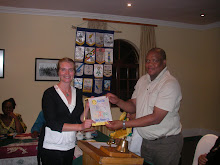I am very impressed with the humanitarian work done in Swaziland by Rotarians. Rotary clubs here are small, but effective. The Malkerns club, one of the smallest with 15 members, has the most matching-grant projects in the district, and recently reached 4,700 children with clothing and blanket distributions. Often times Rotarians step in when the government does not provide services.
My host club of Mbabane-Mbuluzi along with their Rotaract club has identified a school without desks where children stand and use the wall and floor to put their books and notepads on. A rousing debate occurred last week at the meeting where Rotarians discussed their role in education. If the government is not fulfilling their responsibility to the people, should Rotarians step in to help? The Rotarians are incredibly concerned about education and the situation in these schools, but they know that they cannot start acting on the government’s behalf. Do they step aside and push the government to provide the services they should? What about these children now with inadequate access to education?
A political atmosphere of rampant corruption makes the Rotarians job very difficult. One Rotarian explained the challenge to me by saying, “Why do I pay taxes? The taxes are supposed to be used for education, health, and other services. But they aren’t being used for this. Someone is becoming rich off my taxes, and now I’m expected as a Rotarian to pay for the desks, when I already paid for them with my taxes. We cannot keep doing this. The government will not change if we do their work for them.”
The country is in a financial crisis and the King just gave himself a raise equal to the entire health budget. There will continue to be humanitarian needs as a result of government inadequacy, so the question of which projects to fund will become even tougher. For the Swaziland Rotary clubs, the tension between a desire to respond to the acute needs of the population and a willingness to hold their government accountable and seek change will only grow tighter.
A visiting Rotarian from the UK stood up and talked about Matching Grants and how to raise money for these projects. He was missing the point. The Swazi Rotarians were saying they have the money for the desks, but if they buy these desks when they should have been provided by the government, will it really be helping in the long term? Will they be fueling a corrupt system when they should be challenging their government to deliver to the people?
It is not easy being a Rotarian in Swaziland. More than any other Rotary meeting I’ve been to, the ones in Swaziland are bursting with urgency and compassion. But they always end with humor. To close the meetings, the sergeant tells a joke…
So… a very shy guy goes into a pub on Valentine’s Day night and sees a beautiful woman sitting alone at the bar. After an hour of gathering up his courage, he finally goes over to her and asks tentatively, “um, would you mind if I bought you a drink?” She responds by yelling, at the top of her lungs, “no, I won’t sleep with you tonight!” Everyone in the pub is now staring at them. Naturally, the guy is hopelessly and completely embarrassed and he slinks back to his table totally red faced.
After a few minutes, the woman walks over to him and apologizes to him and says, “I’m really sorry if I embarrassed you just then. You see, I’m a graduate student in psychology and I’m studying how people respond to embarrassing situations.” The man responds, at the top of his lungs, No I will not pay $200!”

















































